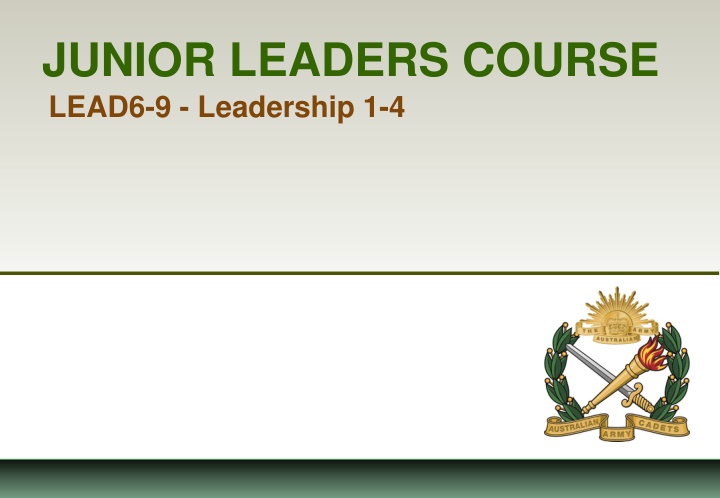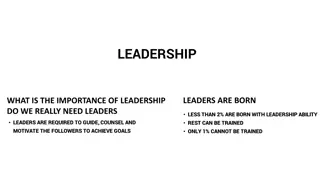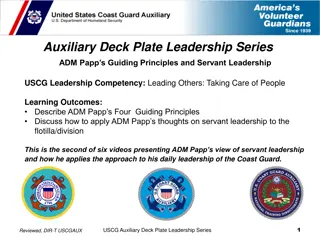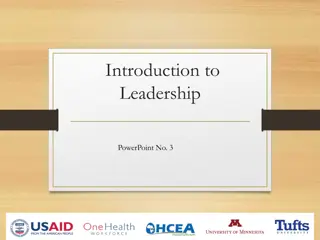
Effective Leadership Principles for Junior Leaders Course
Discover the essence of leadership in the junior leaders course through influencing, directing, and fostering a sense of responsibility. Learn about key aspects such as esprit de corps, discipline, and morale to enhance leadership skills.
Download Presentation

Please find below an Image/Link to download the presentation.
The content on the website is provided AS IS for your information and personal use only. It may not be sold, licensed, or shared on other websites without obtaining consent from the author. If you encounter any issues during the download, it is possible that the publisher has removed the file from their server.
You are allowed to download the files provided on this website for personal or commercial use, subject to the condition that they are used lawfully. All files are the property of their respective owners.
The content on the website is provided AS IS for your information and personal use only. It may not be sold, licensed, or shared on other websites without obtaining consent from the author.
E N D
Presentation Transcript
JUNIOR LEADERS COURSE LEAD6-9 - Leadership 1-4
REVISION Slide 2
INTRODUCTION A Leader will be presented with many tasks. To tackle any task quickly and efficiently, the Leader must take responsibility to prepare: - their subordinates - Themselves Leadership is the art of consistently influencing and directing people so as to obtain their willing obedience, confidence, respect and loyal co- operation. Slide 3
LEADERSHIP The art of consistently influencing and directing people so as to obtain their willing obedience, confidence, respect and loyal co-operation. Slide 4
STATEMENT OF OBJECTIVE By the end of these periods you will:- - Understand esprit de corps, discipline and morale - Understand needs - Understand the functions and qualities of a leader Slide 5
ESPRIT DE CORPS A sense of pride in belonging to a unit. Demonstrated by: - Dress and bearing - Alert response - Saluting - Cleanliness - Good conduct Slide 6
DISCIPLINE A state of mind that produces a readiness for willing and intelligent obedience and appropriate conduct. Slide 7
DISCIPLINE AND PUNISHMENT Discipline - a state of mind - obtained by good leadership not by punishment Punishment - used to correct and prevent the recurrence of misconduct and wilful faults A high level of discipline ensures organisation and stability within a unit. Without discipline, the unit will be unable to operate in an orderly way. Predictable patterns of behaviour will not occur, and members won t work together towards a common goal. Slide 8
DISCIPLINE Types: - Imposed - Self - Collective Demonstrated by: - Dress and Bearing - Good conduct - Alert response - Keenness - High level of training - Esprit de corps Slide 9
MORALE Morale is a state of mind, an attitude of confidence and well-being in the mind of individuals when they identify themselves with a group and accept group goals. Factors affecting morale: - Leadership - Unity of purpose - Discipline - Self respect - Comradeship - Mutual respect - Comfort and security - Training Slide 10
The three concepts are linked. It is impossible to have a high level in any one area without a corresponding high level in the areas. Morale Esprit de Corps Discipline Slide 11
THEORY OF GROUP NEEDS TASK needs: Needs relating to the task. TEAM needs: Needs relating to maintaining the team. INDIVIDUAL needs: Needs of the individuals of the team Slide 12
THEORY OF GROUP NEEDS Within a leaderless group the person who satisfies the needs will become the leader. A leader must: - Identify the TASK - Control the TEAM - Direct the SKILLS - Satisfy the NEEDS Slide 13
THEORY OF TASK NEEDS Define the TASK Explain the TASK Prepare and issue ORDERS Amend the PLAN as necessary Slide 14
THEORY OF TEAM NEEDS A group of skilled individuals will eventually achieve a set task BUT they will achieve it a lot quicker if they work together as a team! Team work may occur naturally or as a result of motivation, mutual respect and goodwill. A group under pressure or subject to frustration needs a leader to keep the group together by maintaining team spirit through motivation, incentive and/or reward. Slide 15
THEORY OF INDIVIDUAL NEEDS Lower Needs - Food - Water - Shelter - Rest - Exercise - Warmth Higher Needs Security Status Personal satisfaction Acceptance Slide 16
FUNCTIONS OF A LEADER Planning - Define what has to be done - Gather information - Make a workable plan Initiating - Brief the team - Convince the team the task is worthwhile and the plan will work - Allocate tasks to team members - Setting team standards Slide 17
FUNCTIONS OF A LEADER Controlling - Maintain discipline and team standards - Influence the speed of the work - Keep the discussion relevant - Ensure actions conform to the plan Supporting - Accepting team members and their contributions - Encouragement - Creating team spirit - Relieving tension - Resolving disagreements Slide 18
FUNCTIONS OF A LEADER Informing - Clarifying the TASK and the PLAN - Giving new information to the TEAM - Receiving information from the TEAM - Summarising suggestions and ideas Evaluating - Checking the workability of ideas - Comparing TEAM performance against required standard Slide 19
LEADERSHIP STYLES Authoritative Participative Free Reign Slide 20
AUTHORATIVE Leader retains control - Determines all policies - Direct activities step by step - Assigns TASKS to INDIVIDUALS - Allocates work TEAMS Suitable when - Emergency, stress or danger - Time is short - Conditioning to quick response (such as drill) - Large numbers involved Slide 21
PARTICIPATIVE Encourages suggestions, cadets identify with the plan Plan future activities by discussion Permit TEAM to choose work groups and divide TASKS When advice is needed, suggest options allow TEAM to select Includes self in TASK in co-operative, friendly manner but retains position as LEADER Slide 22
PARTICIPATIVE Useful when - Teaching complex skills and knowledge - Problem solving in other than stress situation - Instructing - Under personal hardship - Interviewing and counselling Slide 23
FREE REIGN Generally unsuited to cadets, however is used by specialists (such as an orderly room or Q staff) Can be used when cadets organise their own entertainment Slide 24
ORGANISATIONAL STRUCTURE Is the way my TEAM is structured the best to achieve the TASK? If not then change the way your TEAM is organised! Slide 25
NINE PRINCIPLES OF LEADERSHIP 1. Appreciate your own strengths and weaknesses. Pursue self improvement. 2. Seek and accept responsibility 3. Lead by example 4. Make sure the task is understood, supervised and accomplished 5. Know your subordinates and look after their welfare 6. Develop the leadership potential of your section 7. Make sound and timely decisions 8. Train your subordinates as a team and employ them up to their capabilities 9. Keep subordinates informed of the mission, the changing situation and the overall picture Slide 26
1ST PRINCIPLE Appreciate your own strengths and weaknesses. Pursue self improvement. - Review your own performance - Seek honest opinion of associates - Seek self improvement by: Study the success or failure of others Improve communication skills Define achievable goals- and attain them Slide 27
2ND PRINCIPLE Seek and accept responsibility - Take the initiative - Pursue the action you believe your superior would take - Learn the duties of the superior and be prepared to take over, if necessary - Accept all opportunities for command - Perform EVERY task to the best of your ability - Accept fair criticism - Admit your own mistakes - Stick to what you think is right - Accept responsibility for success and failure Slide 28
3RD PRINCIPLE Lead by example - YOU set the example for others to follow - Poor examples can be used by subordinates to excuse shortcomings - Respect, pride and a desire to match your standards will naturally follow - Set and maintain group standards to create team spirit Slide 29
3RD PRINCIPLE Hints: Be physically fit, mentally alert, cheerful, interested, well groomed and correctly dressed at all times Control your emotions Be calm confident and optimistic in all situations Ensure personal habits are not open to criticism, show self discipline Exercise initiative and encourage it in your subordinates Avoid favouritism Stand by your principles but be prepared to accept responsibility for mistakes made by you or your group Share the dangers and hardship experienced by your group Slide 30
4TH PRINCIPLE Make sure the task is understood, supervised and accomplished - Orders must be clear and concise - Check that the orders are understood - Check that the orders are being carried out - Ensure the job is completed to your satisfaction - Remember: Plan >> Brief >> Maintain Standards Slide 31
4TH PRINCIPLE Hints: - Ensure there is a need for the order - Use the Chain Of Command - Think clearly - Give clear, simple orders - Encourage questions to clear up problems - Supervise to ensure the orders are being carried out - Don t over supervise - Assist the team to achieve the task Slide 32
5TH PRINCIPLE Know your subordinates and look after their welfare Be able to satisfy the lower and higher needs of each subordinate Hints: - Be friendly and approachable - Know your subordinates and use their name - Be concerned for their living and working conditions - Be fair and firm in administering discipline - Share privileges equally - Seek to assist in personal problems Slide 33
6TH PRINCIPLE Develop the leadership potential of your subordinates Delegating authority - Shows faith - Allows use of initiative - Encourages to accept responsibility Hints: Use the chain of command State WHAT is to be done, not HOW Supervise- intervene only when necessary Recognise the accomplishments quickly Openly praise Constructively correct errors Trust your subordinates and have faith Slide 34
7TH PRINCIPLE Make sound and timely decisions Indecision leads to: - Inability to take advantage of opportunities - Loss of confidence from subordinates Must be able to assess the situation quickly and make prompt, sound decisions Applies to all functions of leadership but especially when making and / or adjusting the PLAN Slide 35
7TH PRINCIPLE Hints: - Practice making logical assessments of ALL factors before coming to a decision - Plan ahead and work out solutions to possible problems - When possible, consider the advice, suggestions and feeling of subordinates and the effect of your decisions on them - Keep all subordinates informed of your policies and plans so they can also plan ahead Slide 36
8TH PRINCIPLE Train your subordinates as a TEAM and employ them up to their capabilities - It s YOUR responsibility - Teamwork is the key to success - Develop teamwork during training - Create and maintain team spirit - Subordinates perform better when sharing goals and achievements Slide 37
8TH PRINCIPLE Hints: - Ensure training is keeping pace with the Training Program - Make the training as relevant and realistic as possible - Educate subordinates in the duties of other team members - Let subordinates know the importance of their role within the team - Seek tasks that the group can perform and be challenged along the way Slide 38
9TH PRINCIPLE Keep subordinates informed of the MISSION, the changing SITUATION and the overall picture - Reduces the impact of rumours - Morale and confidence is maintained - Keep the task and progress clearly identified at all times Hints: - Explain why a task must be done - Explain how the task will be accomplished - Be alert to the spread of rumours, replace them with the truth Slide 39
ADDITIONAL GUIDELINES Personal Conflict - Identify with the group - do not become one of the boys - leads to a loss of respect - Especially applicable (and hard) for a JNCO - Don t buy your way in, becoming known as a push over does not inspire confidence Respect - Earn the respect of your subordinates - don t demand it - Respect will come from achieving a high level of professionalism and ability Slide 40
ADDITIONAL GUIDELINES Fairness - Be firm - but fair - Do not have favourites - Consider the strengths and weaknesses of each person - Fairness is difficult to achieve - requires self discipline and constant awareness of human weaknesses - Failing to achieve fairness will destroy the team spirit Slide 41
QUALITIES OF A GOOD LEADER Motivation Courage Decisiveness Responsibilities Initiative Judgement Knowledge Loyalty Selflessness Communication Slide 42
SENIOR / SUBORDINATE RELATIONSHIPS As a JNCO you need to be loyal and supportive to your section members and your superior ranks. Slide 43
QUESTIONS? Slide 44
REVISION What are the 9 Principles of Leadership? 1. Appreciate your own strengths and weaknesses. Pursue self improvement. 2. Seek and accept responsibility 3. Lead by example 4. Make sure the task is understood, supervised and accomplished 5. Know your subordinates and look after their welfare 6. Develop the leadership potential of your section 7. Make sound and timely decisions 8. Train your subordinates as a team and employ them up to their capabilities 9. Keep subordinates informed of the mission, the changing situation and the overall picture Slide 45
REVISION Which phrases should a good leader adopt? - Do as I say - not as I do - Say what you mean. Mean what you say - Prior preparation and planning prevents piss poor performance seven P s - Lead by example - Don t ask questions - just do it - Be firm - but fair - Near enough is good enough - I am your superior - you WILL respect me! - Leaders are born - not made Slide 46
SUMMARY DON T LET THIS BE YOU! Which way did they go? Which way did they go? How many of them were there? How many of them were there? How fast were they going? How fast were they going? I MUST find them! I MUST find them! I am their LEADER!! I am their LEADER!! Slide 47
NEXT LESSON Slide 48






















